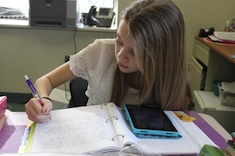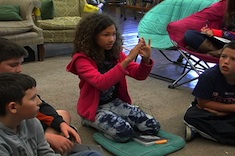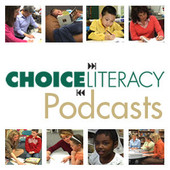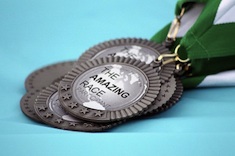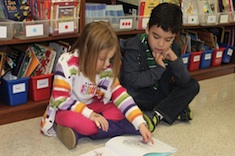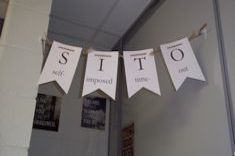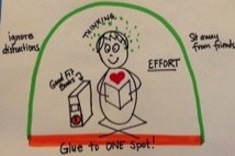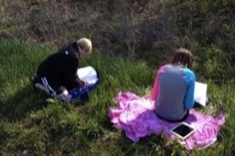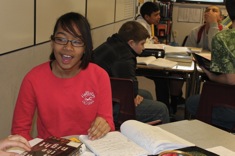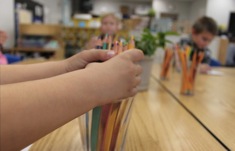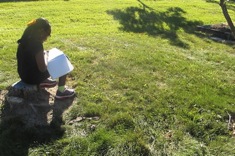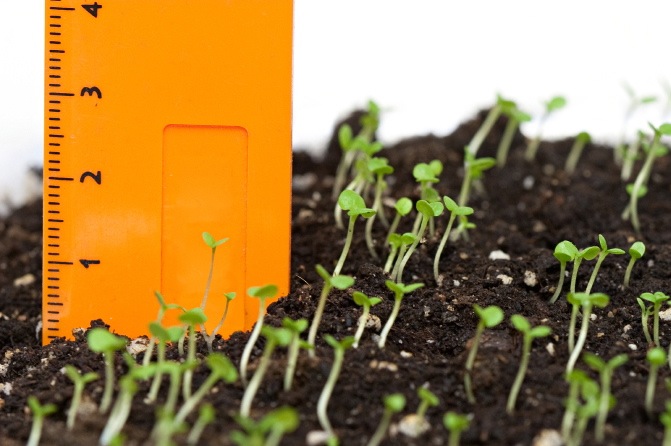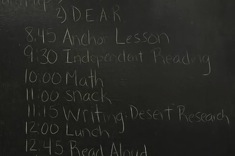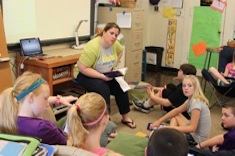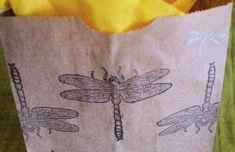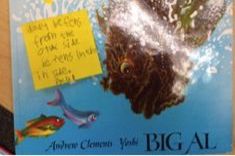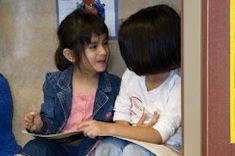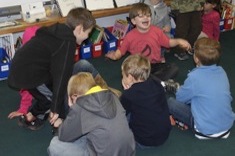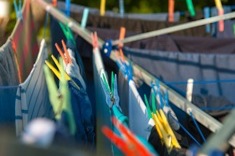Community Building
It's one of the big paradoxes of literacy instruction - students best learn how to read and write independently when they have a strong community of support in classrooms. How teachers build those thoughtful, kind, and challenging classroom communities is explained in these resources.
Latest Content
Last Chance Workshop
Christy Rush-Levine breaks her routine of responding to student writing, and instead calls on students to guide and support peers. She shares some surprising results.
Nonfiction Research Group in Fifth Grade
Katherine Sokolowski meets with a group of fifth graders who are all researching the use of nets in fishing and the environmental effects of the process. She works to build connections among classmates as well as research skills.
Lester Laminack on Bullying (PODCAST)
In this podcast, Franki Sibberson chats with Lester Laminack about bullying. Lester is the author of beloved books for children and teachers including Saturdays and Teacakes and Unwrapping the Read Aloud
.
Writing for Reflection at the End of the Year
Katherine Sokolowski reflects on ways to extend the learning from an end-of-year activity all the way to the fall.
Amazing Race
Gretchen Schroeder uses the format of the Amazing Race television show to help her high school students master materials for final exams and get moving throughout the school for a fun break.
Purposeful Partners
Tara Barnett and Kate Mills find the young learners in their classroom have mastered the art of turning and talking only with close friends. They provide practical suggestions for expanding the circle of peer response.
A Place to Belong
Andrea Smith reflects on preparing to say goodbye to students and her teaching partner of many years. If you have a favorite colleague who is retiring, you may want to get a hankie ready before you read this one.
SITO: Self-Imposed Time-Out
Christy Rush-Levine takes an oddly shaped unused nook in her classroom and turns it into a charming space where students can choose to take a quiet break with a “Self-Imposed Time-Out” (SITO).
Stamina Bubbles
“Why do you always say ‘Happy reading!’ to us?” This question from a first grader leads Katrina Edwards to develop visual support tools for building stamina during reading workshops.
A Fiction Writing Field Trip
Katherine Sokolowski’s students love writing fiction, but their skills don’t match their enthusiasm. A field trip helps bridge that gap.
Like Teacher, Like Student: Finding Emotional Support in Schools
Andie Cunningham and one of her kindergarten students share something in common at the start of the school year — tears as they struggle to find their place in a new community.
Speed Dating Books
Carly Ullmer presents a fun activity for introducing teens to new books and each other as readers, capitalizing on their interests.
A Booklist for Grandparents Day
Sarah Klim presents a booklist for Grandparents Day, with many suggestions for read alouds to promote the September event.
Why I Stopped Asking, “Where’s Your Pencil?”
Ruth Ayres finds the brain research is grim when it comes to the needs of neglected children, but there is still much that teachers can do to support healthy growth in students from challenging home environments.
What Difference Does Difference Make?
Mary Lee Hahn begins the year with honest and open discussions with her fifth-grade students about diversity.
I Don’t Want to Know What You Did Last Summer: Rethinking Narrative Nonfiction
Stella Villalba rethinks the seemingly innocuous “What did you do last summer?” writing assignment at the start of the year, especially for children who may have more limited experiences than peers.
Growth Lines
Deb Gaby thinks about the importance of baseline information early in the school year.
Doodlebug
What makes a teacher memorable? Recognizing a child's passions from the very first day of school. Jennifer Schwanke recounts how her second-grade teacher did just that.
Easing into Workshops: Routines in Third Grade
This quick and silent time-lapse video shows the arrival routine in Leslie Lloyd’s third-grade classroom.
Perfect Frosting and Workshop Routines
Things start to fall apart in a classroom when a beloved teacher is replaced with a long-term substitute. Deb Gaby shares how an analogy helps the class get back on track.
Read Alouds as “Third Things”
Katherine Sokolowski uses read alouds early in the year to help students reflect on how to be kind and thoughtful members of a classroom community.
More Than Dr. Seuss Hats: Why Events Matter
Franki Sibberson explains how scheduling big events can do important work in building the reading community.
The Beginnings of a Middle School Literacy Community
What do you do on day one? Christy Rush-Levine describes the routines in her middle school classroom.
Potato the Crow: Blurring the Lines Between Reality, Fantasy, and Play with Young Learners
Leslie Woodhouse discovers a dollar store find takes on a life of its own in her preschool classroom in this delightful essay.
Anchoring Language
Katie DiCesare thinks about what language supports student independence early in the year and how to share this in an anchor chart with her first graders.
Worth the Investment
Melanie Quinn finds it is worth taking time for community building in schools and classrooms, because the practice pays dividends all year long.
Words with Friends
Melissa Kolb explores what needs to be in place for our youngest students to learn how to converse kindly.
Setting Goals During Mini-Celebrations
Melanie Meehan recommends linking goal setting to small celebrations as a great way to build community and skills at the same time.
Guess Who’s Coming to Dinner?
Gretchen Schroeder finds the classic dinner party assignment is a fun way for her high school students to explore kindred spirits in literature late in the school year.
Closing Out the Year with “Where I’m From”
Jillian Heise shares a marvelous poetry writing activity for students who are transitioning from elementary to middle school, or middle to high school.
Browse Content By
Type
Category
- Assessment Tools
- Big Fresh Archives
- Booklists
- Choice Numeracy
- Classroom Design
- Common Core
- Community Building
- Conferring
- Content Literacy
- Digital Literacy
- English Language Learners
- Equity
- Family Relations
- Free Samples
- Guiding Groups
- Leadership
- Literacy Coaches
- Mentor Texts
- Minilessons
- New Teacher Mentors
- Podcasts
- Poetry
- Quote Collections
- Reading Strategies
- Self Care
- Struggling and Striving Learners
- Talking and Listening
- Teacher Study Groups
- Teaching Reading
- Teaching Writing
- Word Study and Vocabulary
Author
- Melissa Quimby
- Nawal Qarooni
- Gwen Blumberg
- Julie Cox
- The Lead Learners
- Hannah Tills
- Josie Stewart
- Ruth Metcalfe
- Mallory Messenger
- Becca Burk
- Jodie Bailey
- Vivian Chen
- Mary Brower
- Tiffany Abbott Fuller
- Stephanie Affinito
- Ruth Ayres
- Leigh Anne Eck
- Heather Fisher
- Shari Frost
- Julie Johnson
- Suzy Kaback
- Gigi McAllister
- Shirl McPhillips
- Melanie Meehan
- Cathy Mere
- Debbie Miller
- Tara Barnett and Kate Mills
- Tammy Mulligan
- Dana Murphy
- Bitsy Parks
- David Pittman
- Brenda Power
- Heather Rader
- Matt Renwick
- Mandy Robek
- Christy Rush-Levine
- Gretchen Schroeder
- Jen Schwanke
- Brian Sepe
- Katherine Sokolowski
- Stella Villalba
- Jennifer Vincent
Grade Level
Choice Literacy Membership
Articles
Get full access to all Choice Literacy article content
Videos
Get full access to all Choice Literacy video content
Courses
Access Choice Literacy course curriculum and training

